Key takeaways:
- Preparation is essential for STEM interviews, combining both technical skills and understanding the company culture to enhance confidence and alignment with interviewers.
- Researching the company thoroughly helps to create meaningful connections during interviews, allowing candidates to engage genuinely and showcase shared values.
- Demonstrating technical skills through real-world examples and clear communication is critical, as is highlighting personal growth and collaboration experiences.
- Personalizing responses and sharing personal motivations during interviews can make candidates more memorable and relatable to interviewers.
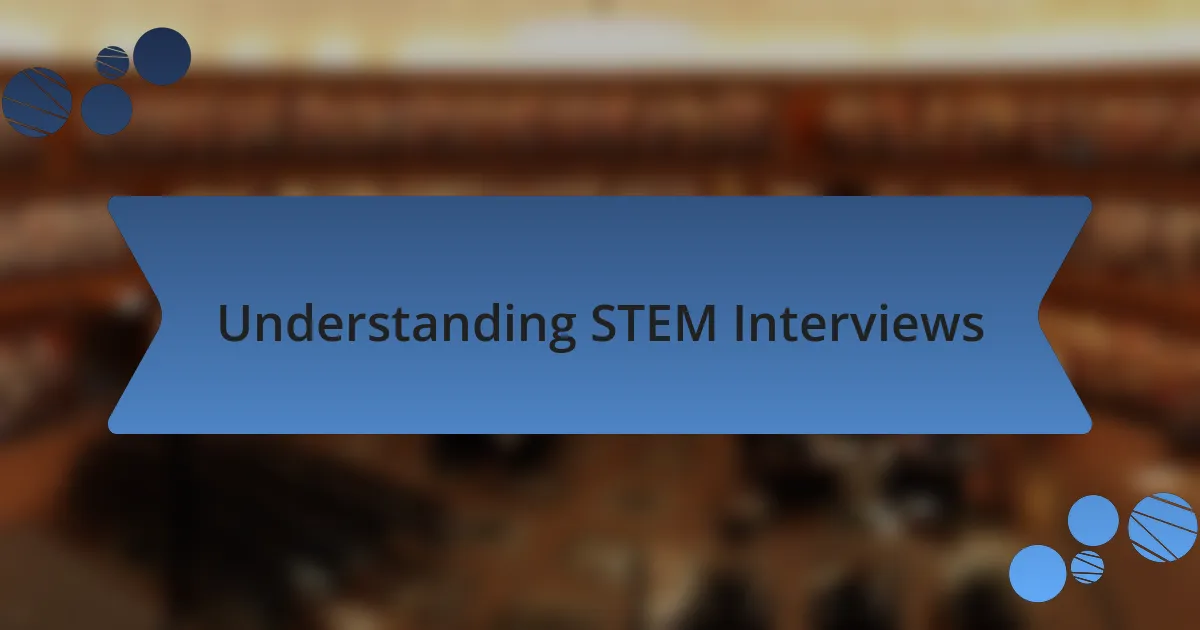
Understanding STEM Interviews
Understanding STEM interviews can be a daunting process if you’re not well-prepared. I remember the first time I faced a technical interview. The pressure was palpable, and I could feel my heart racing as I sat down with the interviewer. Was I truly ready to showcase my skills? In those moments, self-doubt can creep in, but it’s essential to reframe that anxiety into excitement.
These interviews often blend technical assessments with behavioral questions, which can be a bit tricky. For instance, while I was asked to solve a coding problem on the spot, the interviewer also wanted to know how I approached teamwork and communication. It made me realize that they weren’t just interested in my technical abilities but also how I fitted into a team dynamic. Have you ever considered how your soft skills influence your chances of getting hired?
Moreover, the format of STEM interviews can vary significantly, from coding challenges to problem-solving tasks and even casual conversations. I once had an interview where I had to explain a complex algorithm I had developed in a research project. It was nerve-wracking, yet it taught me the importance of communicating my thought process clearly. Anyone can learn the technical aspects, but the ability to articulate your ideas is what truly sets you apart.

Importance of Preparation
Preparation is crucial in STEM interviews. When I looked back at the interviews I aced, I realized that thorough preparation was the common thread. I spent hours reviewing concepts, practicing coding, and even conducting mock interviews with friends. This practice helped me not only recall information but also build my confidence. Have you ever felt how knowing your material inside and out transforms stress into a sense of control?
A profound moment for me occurred during a technical interview when I faced a challenging problem. Because I had practiced similar questions beforehand, I remained calm and thought through the solution logically. I remember how satisfying it felt to break down the problem step by step. It was a reminder that preparation can be the foundation for a successful performance. Isn’t it interesting how our comfort with a topic can dramatically influence our ability to showcase our skills?
Moreover, preparation extends beyond technical skills; it includes understanding the company’s culture. I remember spending time researching the organization I was interviewing with, which enabled me to align my responses with their values. This knowledge not only made me feel more at ease during the conversation but also allowed me to tailor my examples to resonate with the interviewers. What if you could impress them not just with your skills but with your understanding of their mission? That connection can make all the difference.
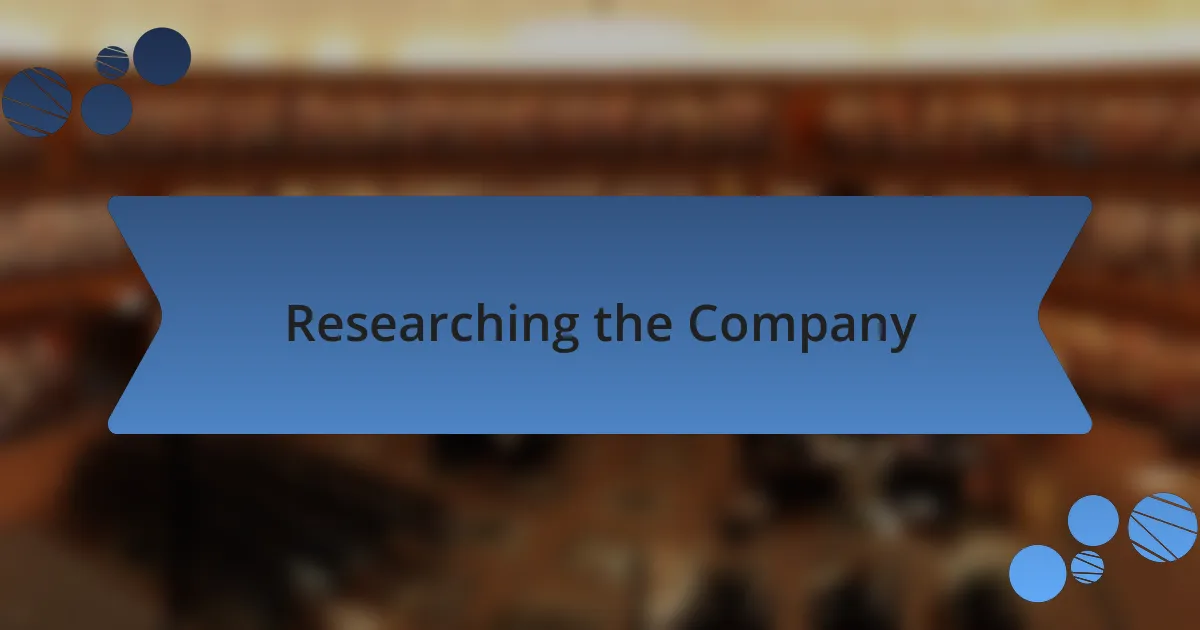
Researching the Company
Researching the company isn’t just about skimming their website; it’s about delving into what makes them tick. I recall a time when I stumbled upon a blog post that highlighted their recent project on sustainability. It was fascinating to learn how they integrated eco-friendly practices into their products. This insight became a wonderful conversation starter during my interview, allowing me to express genuine interest in their initiatives. Have you ever noticed how a shared value can create an immediate connection?
In addition to their projects, understanding the company’s culture played a pivotal role in my preparation. I immersed myself in employee testimonials and social media updates to gauge the daily work environment. I remember feeling a spark of excitement when I discovered their commitment to continuous learning. This aspect resonated with me deeply and influenced how I framed my personal growth experiences during the interview. Isn’t it powerful to showcase your alignment with a company’s ethos?
Lastly, I often check out the company’s recent news or press releases before an interview. I once mentioned a recent award they received for innovation, and I could see the interviewer’s face light up. This not only demonstrated that I had done my homework but also allowed us to celebrate their achievements together. Did you know that little moments like these can leave a lasting impression? It’s those details that can help you stand out in a sea of candidates.
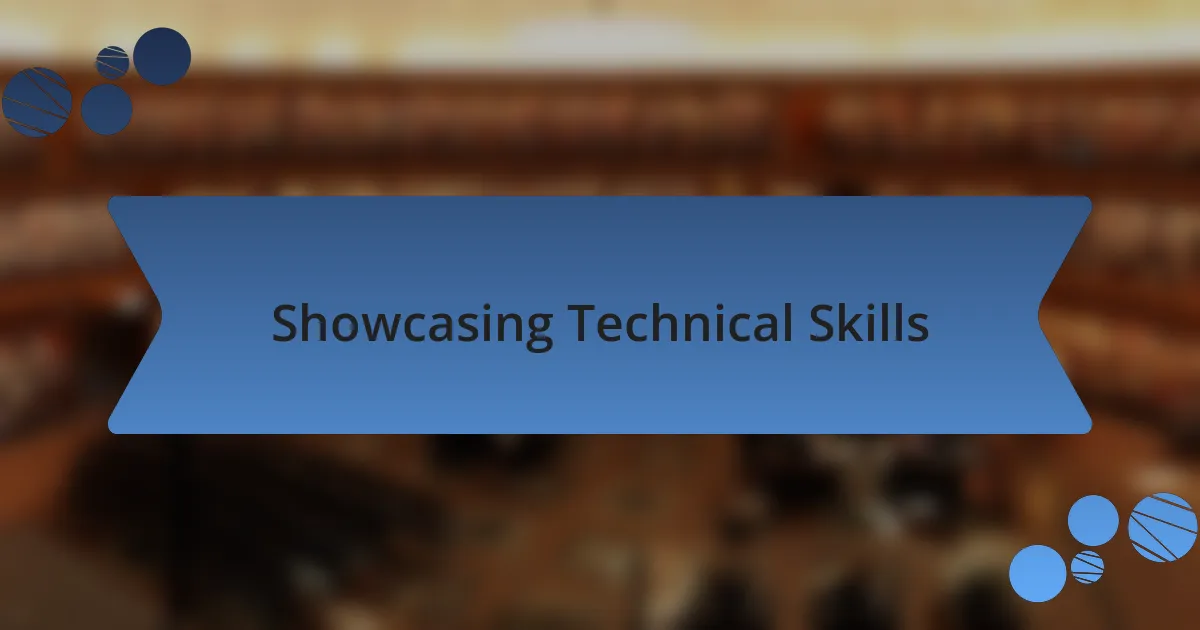
Showcasing Technical Skills
Demonstrating technical skills in a STEM interview is crucial, and I found that illustrating my experience through real-world examples made a significant impact. For instance, during my last interview, I presented a project where I developed a machine-learning model to predict students’ academic performance. When I walked the interviewer through my methodology, detailing the algorithms I chose and why, I could see their interest piqued. Have you ever felt that spark when you explain something you’re passionate about?
One of the most effective ways I showcased my technical skills was through hands-on demonstrations. I remember simulating a coding challenge on a whiteboard, which not only highlighted my problem-solving abilities but also illustrated my thought process. It’s fascinating how tangible evidence of your expertise can transform an abstract skill into something concrete. Wouldn’t you agree that demonstrating your capabilities often speaks louder than mere words?
Moreover, I made sure to bring along a portfolio of my work, which included screenshots and descriptions of my projects. I shared how each project not only honed my technical proficiency but also taught me valuable lessons about teamwork and iteration. This multidimensional approach really resonated with the interviewers and established my candidacy as not just about skills, but also about growth. Have you thought about how highlighting your journey can set you apart?
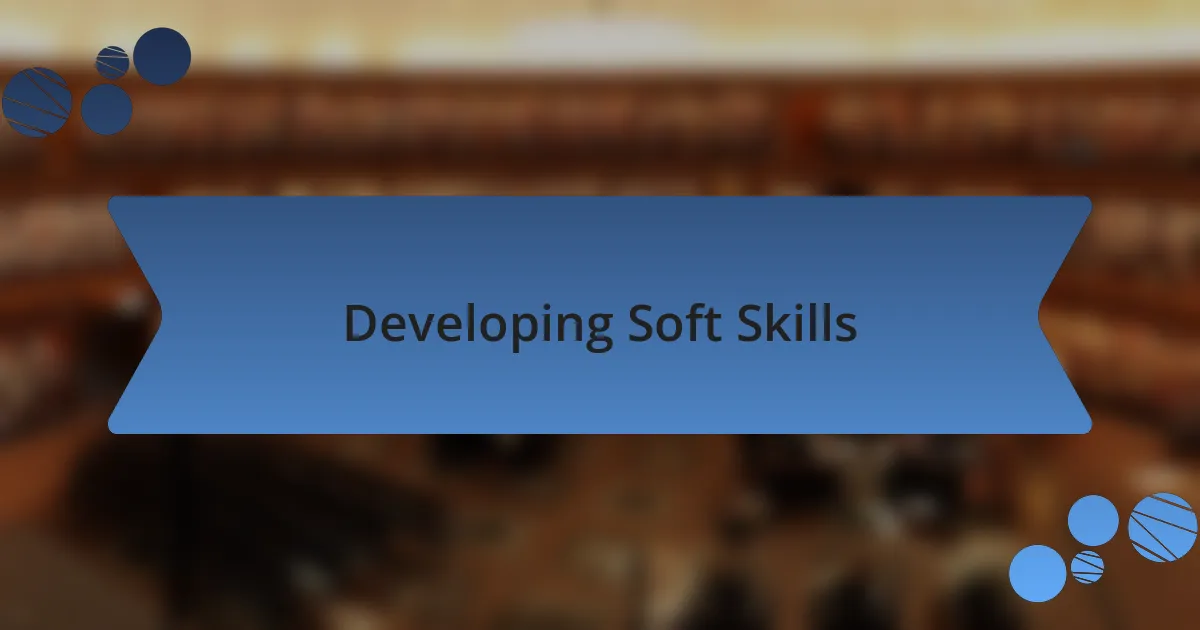
Developing Soft Skills
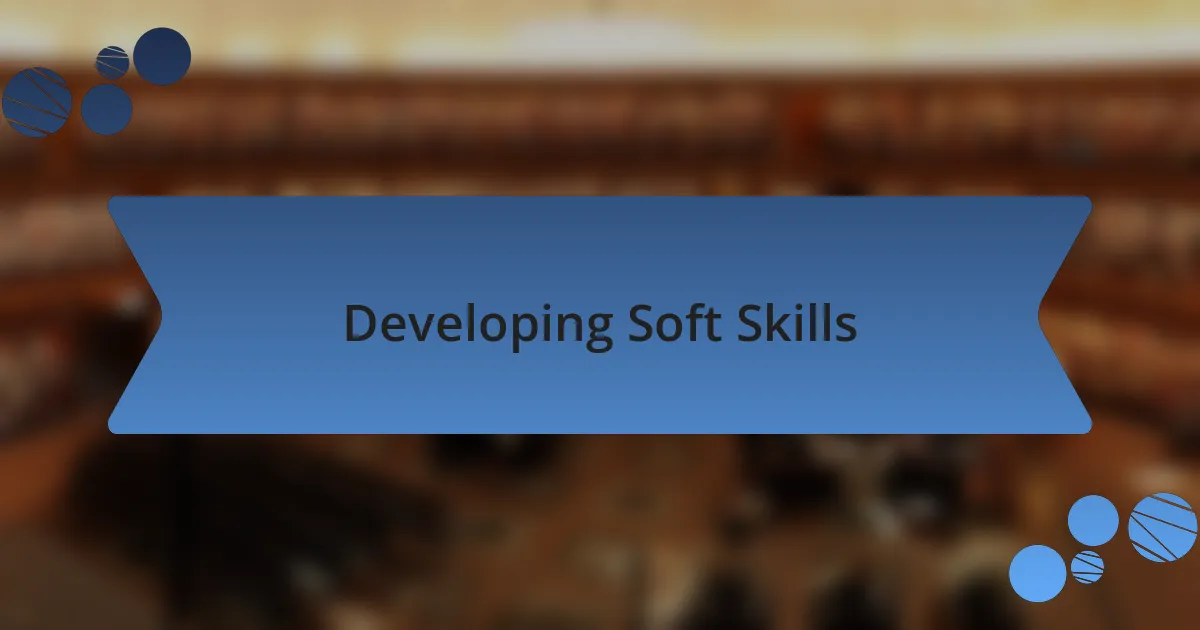
Developing Soft Skills
In the realm of STEM interviews, developing soft skills can often be a game-changer. I remember one particular instance where my ability to communicate complex ideas clearly set me apart from other candidates. When I simplified a technical concept for a non-technical interviewer, their expression changed from confusion to understanding, which highlighted the importance of adaptability in communication. How often do you find it challenging to bridge that gap between technical jargon and relatable language?
Collaboration is another crucial soft skill. During a group project in college, I took on the role of mediator, ensuring that all voices were heard. This experience taught me how to navigate differing opinions and reach a consensus, which later proved vital in my job interviews. Have you ever reflected on how your ability to work with others can affect your chances of landing a job?
Lastly, emotional intelligence plays a significant role in interviews. I learned to read the room, sensing when an interviewer was eager for deeper insights or when they preferred brevity. One memorable interview taught me that being attuned to others’ emotions could create a connection, transforming a formal Q&A into an engaging conversation. Have you considered how your emotional awareness might influence the outcome of your interviews?
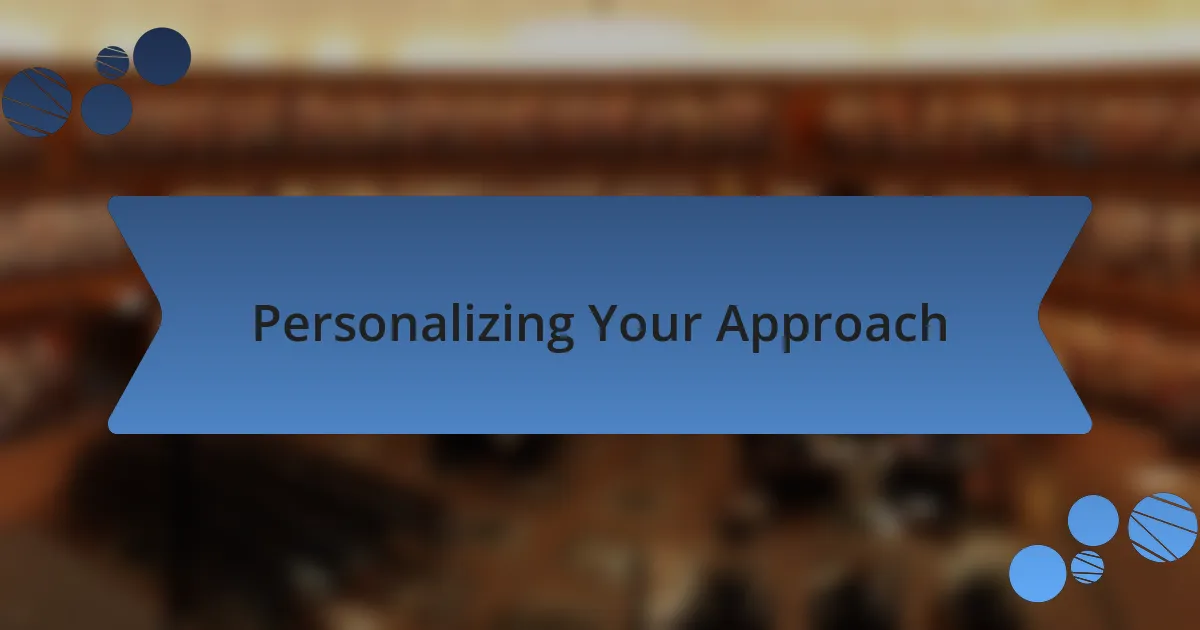
Personalizing Your Approach
When crafting your approach for a STEM interview, personalizing your responses can make a significant difference. I recall a time when I tailored my answers to mirror the values and projects of the company I was interviewing with. By linking my past experiences directly to their mission, it felt like I was having a conversation rather than just answering questions. Have you considered how understanding a company’s culture can help you stand out?
Another strategy is to infuse your personality into your responses. During one interview, I shared a unique project I was passionate about, discussing not just the technical details but also the personal drive behind it. This enthusiasm resonated with the interviewers, showing them not just my skills but who I am beyond the resume. Do you think sharing your personal motivations can create a memorable connection?
Moreover, asking tailored questions at the end of the interview can demonstrate your genuine interest. After one interview, I asked about their approach to fostering innovation within their team, sparking an engaging dialogue. This not only provided me insights into their work environment but also showcased my eagerness to be an active contributor. Have you thought about how your curiosity could leave a lasting impression?
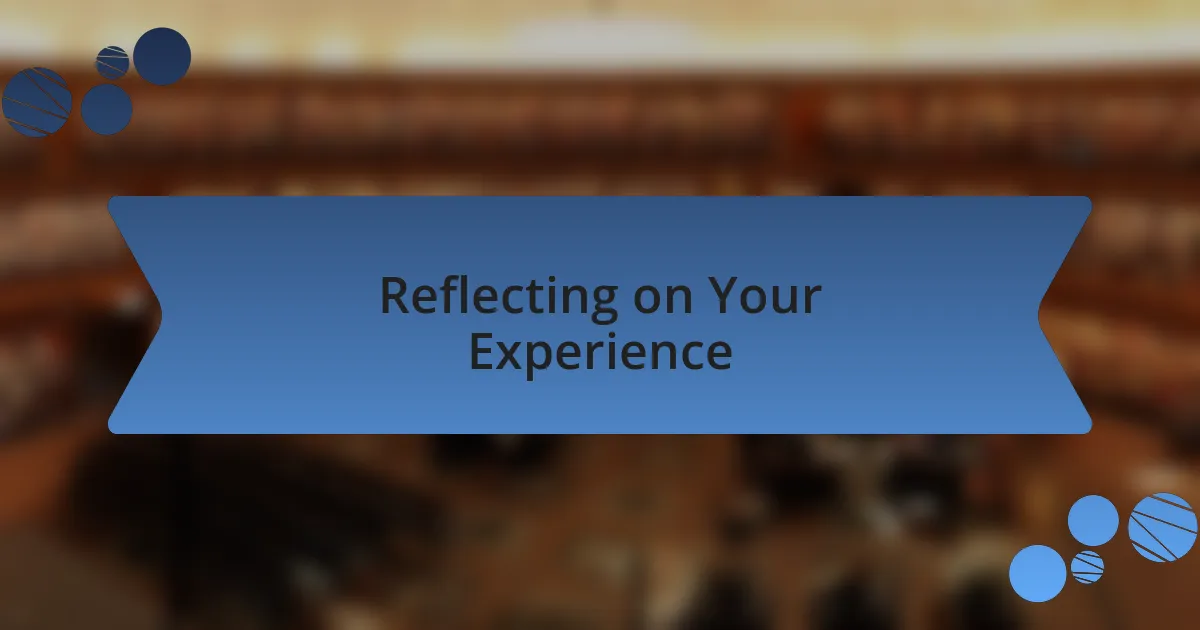
Reflecting on Your Experience
Reflecting on your experiences isn’t just a memory exercise; it’s an insightful way to prepare for interviews. When I was rehearsing for a technical role, I took time to revisit the projects I had worked on. I didn’t stop at answering technical questions; I reflected on the challenges I faced and how they sparked my interest in the field. Have you ever thought about how those moments, where you overcame obstacles, can make your story more compelling?
One time, while preparing for a coding interview, I dug deep into my experience with a team project that didn’t go as planned. I identified the lessons I learned from that experience, especially about collaboration and communication. Sharing this allowed me to illustrate not just my technical skills, but also my growth mindset. How do your setbacks shape your professional journey?
Lastly, it’s important to recognize the emotions tied to your experiences. I remember feeling an overwhelming sense of accomplishment when I completed a complex project. Conveying that passion during my interviews made me more relatable and engaging. Can you capture those moments of triumph or struggle to connect with your interviewers? Embracing your story, with all its ups and downs, is what truly sets you apart.